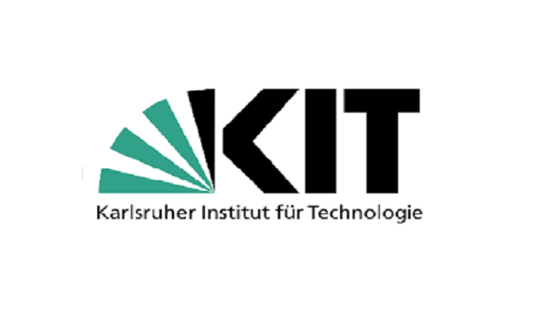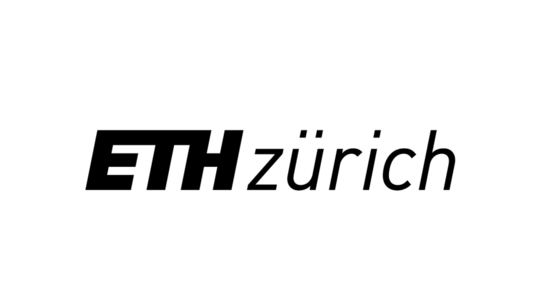Transdisciplinary Research
Transdisciplinary Research
Transdisciplinarity research (TD research) is an accompanying research and investigates the cooperation of science and society in TRANSENS on a superordinate level. Central questions are, first, how a transdisciplinary research process should be designed and, second, what 'added value' can be created compared to interdisciplinary research (i.e. without the participation of non-specialists). The TdLab of ETH Zurich conceptualizes and leads TD research. An overview of transdisciplinarity research is given in the following booklet.
Responsible: Dr. Pius Krütli (ETH Zurich, TdLab)
-
The disposal of highly radioactive waste in the geological subsurface and the associated search for a site in Germany has been an ongoing project for more than 50 years. The technical challenges of the repository were increasingly joined by societal demands. The site search thus developed into a problem in which technical as well as societal issues must be considered.
The Site Selection Act (StandAG) requires that the public be involved in the search for and selection of a repository site. The further development of procedures for public participation is also desired beyond the legally regulated minimum requirements (§5 StandAG). This is where the TRANSENS project comes in. It offers a field of experimentation in which scientists and representatives of society (e.g. citizens, persons from authorities, associations, non-governmental organizations) jointly investigate the disposal problem. In this way, different perspectives, interests, experiences and bodies of knowledge are included in the research. Such a research approach makes it possible to work together to find a solution to the disposal problem. The goal is to link the best possible techniques and societal requirements (e.g., a fair site search process). This is intended to achieve a robust solution that takes into account the ideas and concerns of the public. This type of collaboration is referred to as transdisciplinary research. This research occurs in the TAPs (transdisciplinary work packages, i.e., DIPRO, HAFF, SAFE, TRUST).
In contrast, transdisciplinary research examines this collaboration between science and society at a higher level. That is, it examines how (a) transdisciplinary research works, (b) what added value it can achieve compared to classical research approaches, and (c) what contribution it can make to solving the nuclear waste management problem. In addition, transdisciplinarity research provides the scientists* in the TAP with methods and tools to shape collaboration. Experiences are continuously collected and discussed with the scientists* in order to make improvements in the collaboration.
The goals of transdisciplinarity research are:
- to follow and understand the development of new knowledge and approaches to solutions;
- To determine the benefits of collaboration to the disposal problem;
- To help scientists* collaborate with representatives from the community.
Questions of transdisciplinarity research are:
- What new knowledge is created through collaboration between science and society?
- Can the knowledge contribute to solving the nuclear waste management problem?
- What is the added value of this collaboration compared to previous purely disciplinary or interdisciplinary research without representatives from society?
- What are the disadvantages and limitations of this collaboration?
- Which forms of collaboration are suitable (e.g. type of workshop, methods)?
- What effects does the collaboration have on the participating representatives of society, the scientists, and the research?
-
The TdLab of ETH Zurich conducts the transdisciplinarity research together with the Institute for Technology Assessment and Systems Analysis (ITAS) of KIT and the Research Center for Sustainability (FFN) of FU Berlin. This group of scientists*, reinforced by researchers from the Institute of Radioecology and Radiation Protection of Leibnitz University Hannover (IRS-LUH), constitutes the so-called BegleitTeam.TD.
The following graphic shows how the groups involved in the TRANSENS project relate to each other and work together. "Representatives of the society" work together with the scientists. These two groups jointly conduct "transdisciplinary (td) research", each with their own thematic focus in the TAPs. The BegleitTeam.TD examines this collaboration to identify findings and experiences ("transdisciplinarity research"). In addition, regular reflection critically examines this collaboration and discusses possible improvements.
The TdLab conducts complementary trainings and consulting with and for the mentioned groups (support).
Transdisciplinary research vs. transdisciplinary research
Transdisciplinary research means that research is conducted on the thematic corridors of the transdisciplinary work packages (TAP) with the involvement of governmental, private sector and civil society actors*.
Transdisciplinarity research reflects transdisciplinary research processes across TAPs and synthesizes them. It also supports transdisciplinary project design and deals with R&D of transdisciplinary tools.
You can download the flyer here.
-
Transdisciplinarity research is divided on the one hand into the study of collaboration, which also includes regular reflection, and on the other hand into support for transdisciplinary foundations. Strictly speaking, we do not count the support as transdisciplinarity research, since no research is done here. This includes training on the organization of collaboration and consultation on transdisciplinary topics.
Transdisciplinarity research consists of an analysis (with regular reflection) and a synthesis based on it. The aim of the synthesis is to work out conclusions for the solution of the disposal problem. The analysis includes three fields of investigation:
- "Knowledge production" aims to clarify what new knowledge is created through collaboration between researchers and stakeholders in society (= transdisciplinary research).
- "Impact on researchers" examines the effects of the collaboration on the researchers as well as the changes in the research work.
- "Impact on participants" examines the impact of the collaboration on the representatives of society (e.g., changes in views, values, perceptions, requirements for disposal).
The subsequent synthesis focuses on three areas:
- "transdisciplinary implementation", which examines the procedure in the project with regard to transdisciplinary characteristics and evaluates the benefits and, if applicable, difficulties of including representatives from society.
- In "methods and tools", the forms of collaboration (e.g. type of workshop, focus groups, etc.) and tools used (e.g. visualizations, digital techniques, creativity techniques) are assessed in terms of their suitability.
- "Nuclear waste management context" includes the conclusions that can be drawn for problem solving of waste management (taking into account the current public discussion).
![[Translate to English:] [Translate to English:]](/fileadmin/_processed_/a/5/csm_Network_2c01d9a741.png)
![[Translate to English:] [Translate to English:]](/fileadmin/_processed_/5/6/csm_rad-hazard-waste_2163d15ef7.png)
![[Translate to English:] [Translate to English:]](/fileadmin/_processed_/9/7/csm_Akteursanalyse_59e81ec7c7.png)
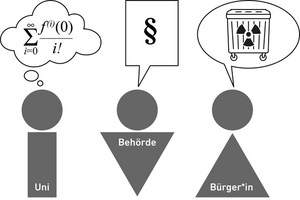
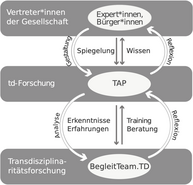
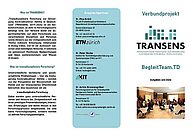
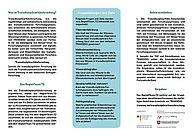
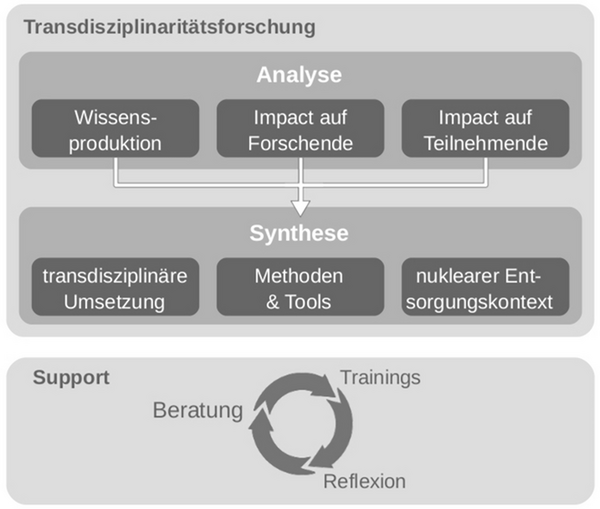
![[Translate to English:] [Translate to English:]](/fileadmin/_processed_/8/1/csm_UniBerlin_2090fb9c61.png)
